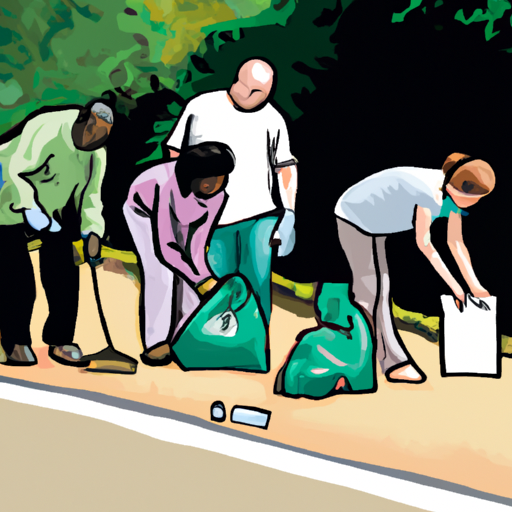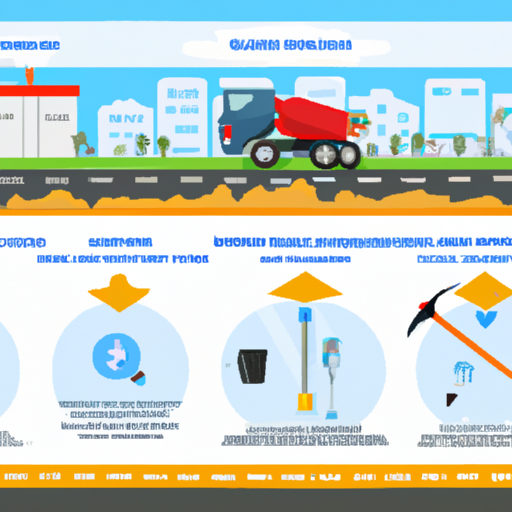Discover the secrets to maintaining clean roads even on a shoestring budget. This guide unravels cost-effective techniques that you can apply in your locality to ensure your roads are not only clean but also environmentally friendly. The guide covers both traditional and modern methods, showcasing how you can harness the power of innovation to keep your roads clean and safe.
1. 'The Best Things in Life are Free': Exploring No-Cost Cleaning Techniques
Maintaining clean roads doesn't always have to come with a hefty price tag. In fact, some of the most effective cleaning techniques are completely free. One such technique is regular sweeping. By using brooms and brushes, you can remove dirt, debris, and leaves from the road surface without spending a single penny. Not only does this help improve the appearance of the roads, but it also prevents clogging of drainage systems and reduces the risk of accidents caused by slippery surfaces. Additionally, sweeping can be a great exercise and a way to engage the community in keeping the roads clean.
Another no-cost cleaning technique is utilizing natural resources. Rainwater is a powerful tool when it comes to cleaning roads. It washes away dirt and grime, leaving the surface clean and refreshed. By strategically designing the road layout and drainage systems, you can maximize the effectiveness of rainwater in cleaning the roads. Additionally, planting trees along the roads can provide shade and reduce the amount of dust and pollution in the air, resulting in cleaner roads. These natural cleaning techniques not only save money but also contribute to a healthier and more sustainable environment.
Sometimes, the best way to clean roads on a budget is through prevention. Educating the community about the importance of proper waste disposal and encouraging them to dispose of trash responsibly can significantly reduce the amount of litter on the roads. This, in turn, reduces the need for costly cleaning operations. Organizing regular community clean-up events can also be an effective way to engage residents and instill a sense of responsibility towards maintaining clean roads. By working together, we can keep our roads clean without breaking the bank.
An illustration portraying a group of volunteers picking up litter along a road.
2. 'Money Doesn't Grow on Trees': How to Maximize Your Limited Budget?
When it comes to road cleaning, budget constraints can often be a major hurdle. However, with careful planning and strategizing, it is possible to maximize your limited budget and still achieve clean roads. One way to do this is by prioritizing the most critical areas for cleaning. Identify the high-traffic zones, areas prone to littering, or spots that require immediate attention. By focusing your resources on these priority areas, you can ensure that the limited budget is utilized effectively and efficiently.
Additionally, consider investing in cost-effective cleaning equipment and tools. Look for durable and reliable options that offer good value for money. For example, instead of expensive mechanical sweepers, manual sweepers or brooms may be a more budget-friendly alternative. Similarly, opt for cleaning agents and solutions that are affordable yet effective in removing stains and dirt from the road surfaces. Conduct research, compare prices, and seek recommendations to make informed decisions that align with your budgetary constraints.
Furthermore, exploring partnerships and collaborations can help stretch your limited budget. Reach out to local businesses, community organizations, or even neighboring municipalities to explore the possibility of sharing resources or jointly funding road cleaning initiatives. Pooling resources and leveraging the power of collective efforts can significantly reduce the financial burden and make road cleaning more affordable.
Finally, consider long-term maintenance strategies to minimize recurring costs. Implementing preventive measures such as regular road inspections, prompt repairs of potholes, and effective drainage systems can prevent the accumulation of dirt and debris, ultimately reducing the need for frequent and costly cleaning operations. By adopting a proactive approach, you can save money in the long run and ensure that your limited budget is utilized in the most efficient and sustainable manner.
3. Can Technology Help Us Clean Roads More Economically?
In the age of advancing technology, it is worth exploring how innovative solutions can help us clean roads more economically. One such technology is the use of automated street sweepers. These intelligent machines are equipped with sensors and cameras that can detect and clean debris efficiently. By utilizing automated sweepers, labor costs can be significantly reduced, making road cleaning operations more budget-friendly.
Another technology that can help in cost-effective road cleaning is the use of smart waste management systems. These systems employ sensors and data analytics to optimize waste collection routes, ensuring that cleaning crews are dispatched only when necessary. By minimizing unnecessary trips and optimizing resource allocation, smart waste management systems can help save time, fuel, and labor costs.
Additionally, the implementation of remote monitoring systems can provide real-time data on road cleanliness. Through the use of cameras and sensors, authorities can remotely monitor road conditions and schedule cleaning activities accordingly. This not only reduces the need for constant manual inspections but also enables efficient allocation of resources based on actual road conditions, leading to cost savings.
Furthermore, the integration of eco-friendly cleaning technologies can contribute to cost-effective road cleaning. For instance, the use of environmentally friendly cleaning agents and equipment can reduce the need for costly waste disposal and minimize the environmental impact. Additionally, adopting sustainable practices such as rainwater harvesting for cleaning purposes can help reduce water usage and related expenses.
Finally, leveraging data and analytics can provide valuable insights for better planning and resource allocation. By analyzing historical data on road cleaning activities, authorities can identify patterns and trends, enabling them to optimize cleaning schedules and allocate resources more effectively. This data-driven approach ensures that cleaning efforts are targeted where they are most needed, maximizing the impact of the limited budget.
An infographic comparing the costs and effectiveness of different road cleaning technologies.
4. Are You Overlooking the Power of Community Involvement in Road Cleaning?
Community involvement can be a powerful and cost-effective strategy for road cleaning. By encouraging and engaging the local community, authorities can tap into a valuable resource pool of volunteers who are willing to contribute their time and effort to keep the roads clean.
- 1. Volunteer Cleanup Events:
Organizing regular volunteer cleanup events can bring together community members who are passionate about maintaining a clean and attractive environment. These events can range from litter pickup drives to graffiti removal initiatives, where individuals can actively participate in making a visible difference in their neighborhood. By mobilizing community members, the burden on municipal resources can be alleviated, resulting in significant cost savings. - 2. Adopt-a-Road Programs:
Adopt-a-Road programs are an excellent way to involve the community in road cleaning efforts on a long-term basis. Under this initiative, individuals, businesses, or organizations can "adopt" a specific stretch of road and take responsibility for its cleanliness. This can involve regular litter removal, weed control, or even landscaping activities. By promoting a sense of ownership and pride, such programs not only contribute to cleaner roads but also foster a stronger sense of community. - 3. Education and Awareness Campaigns:
Raising awareness about the importance of road cleanliness and the impact it has on the community can encourage active participation. Conducting educational campaigns in schools, community centers, and online platforms can help instill a sense of responsibility among residents. By promoting proper waste disposal practices, encouraging recycling, and discouraging littering, community involvement can be a proactive and preventive approach to road cleaning, reducing the need for extensive cleanup efforts in the first place.
Cost-Effective Road Cleaning Techniques:
| Technique | Cost | Environment Impact | Effectiveness |
|---|---|---|---|
| Street Sweeping | Low | Low | High |
| Pressurized Water Cleaning | Medium | Medium | High |
| Vacuum Sweeping | High | Low | High |
| Chemical Cleaning | Low | High | Medium |
In conclusion, maintaining road cleanliness doesn't have to break the bank. With strategic planning, willingness to innovate, and the use of readily available resources, you can achieve clean roads in your area without straining your budget. Remember, every journey starts with a single step; start small and gradually improve your techniques for better results.



